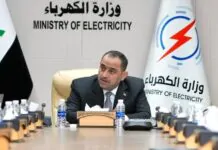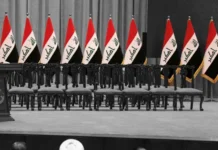The Oil Agreement: Sovereignty For Baghdad And Financial Relief For The Region After An 18-Year Dispute.
Time: 2025/10/02 09:51:20 Reading: 120 times {Economic: Al Furat News} After a hiatus of more than two years, Iraqi Kurdistan’s oil resumed flowing through the Turkish Ceyhan pipeline last Saturday, in a move described as historic and reshaping the interests of Baghdad, Erbil, and Ankara.
The new agreement gives the federal government control over the region’s exports, while providing Erbil with a financial reprieve, at a time when the global market is monitoring the potential impact on crude prices amid fears of a supply glut.
In the following lines, we review the beginning of the crisis, its developments so far, and its potential impact on the market.
Why did Kurdistan’s oil exports stop in the first place?
The crisis surrounding the region’s oil exports via the Iraq-Turkey pipeline dates back to March 2023, when Turkey halted oil pumping following an arbitration court ruling ordering it to pay $1.5 billion to Iraq in compensation for unauthorized oil exports from the region between 2014 and 2018.
Iraq filed an arbitration request in 2014 with the Paris-based International Chamber of Commerce regarding Turkey’s role in facilitating exports from the region without the approval of the federal government in Baghdad. According to Foreign Minister Fuad Hussein, this halt cost the country more than $22 billion in revenue losses.
The original agreement between Iraq and Turkey was signed on August 27, 1973, and the Kirkuk-Ceyhan pipeline became operational in 1977. Its goal was to enable Iraq to export its oil to world markets via the Mediterranean, bypassing the Strait of Hormuz.
Initially, the Iraqi central government owned and operated the entire pipeline. However, after the fall of Saddam Hussein in 2003, the Kurdistan Region began developing its own oil infrastructure, connecting some fields to the Ceyhan pipeline via new pipelines constructed by the region, enabling it to export oil almost independently of Baghdad.
This approach sparked legal and political disputes between the central government and the regional government, and led to legal tensions with Baghdad, which rejected the move as a violation of national sovereignty.
What is the significance of this agreement?
Iraq describes the agreement as historic, under which the federal Ministry of Oil will receive crude oil produced from fields located in the Kurdistan Region and export it via the Iraqi-Turkish pipeline, according to Prime Minister Mohammed Shia al-Sudani. He added in a post on Twitter:
“This ensures the equitable distribution of wealth, diversifies export outlets, and encourages investment. It is an achievement we have waited 18 years for.”
The agreement includes “establishing clear technical and regulatory mechanisms to ensure smooth export flows and transparency in oil revenues, thus contributing to increased federal budget revenues,” according to a statement from the Iraqi Ministry of Oil. The discussions that led to this agreement stemmed from “a shared national vision aimed at strengthening Iraq’s role as a major player in the global energy market.”
The agreement was also welcomed by the US administration. US Secretary of State Marco Rubio said in a statement: “We welcome the announcement that the Government of Iraq has reached an agreement with the Kurdistan Regional Government and international companies to reopen the Iraq-Turkey pipeline. This agreement was facilitated by the United States and will deliver tangible benefits to both Americans and Iraqis.”
He added, “This agreement will contribute to strengthening the mutually beneficial economic partnership between the United States and Iraq, fostering a more stable investment environment across Iraq for American companies, enhancing regional energy security, and consolidating Iraqi sovereignty.”
The main beneficiaries of the Kurdistan oil export agreement are:
– The federal government in Baghdad is regaining control over the region’s oil exports through SOMO, and thus controlling all oil imports, according to Oil Minister Hayan Abdul Ghani, noting that “pumping operations are proceeding regularly and will increase in the coming days.”
For its part, SOMO confirmed that Iraq will be able to export larger quantities of oil after the return of the Ceyhan pipeline, while indicating that it has surplus oil quantities that will be compensated for. Iraq currently exports approximately 3.4 million barrels per day, out of a total production of approximately 4 million barrels per day.
The Kurdistan Region’s resumption of oil exports through the pipeline linking Iraq and Turkey will help ease economic pressures that have recently led to delays in paying public sector salaries and reduced spending on essential services.
Iraq and the region agreed in July to supply SOMO with the region’s entire production of approximately 230,000 barrels per day (bpd) in exchange for an advance payment of $16 per barrel (in cash or in kind) in accordance with the budget amendment law. The amount should not be less than 230,000 bpd, with any additional production to be added through the Joint Measurement and Calibration Committee, according to Bloomberg. Kurdistan Regional Government Prime Minister Masrour Barzani stated that the oil export agreement represents a “major achievement” for the Iraqi people, expressing his hope that “this agreement will improve the economic infrastructure to serve all citizens.”
Oil producing companies:
Eight international companies, which together account for more than 90% of the Kurdistan Region’s production, had previously agreed to the export agreement. However, the Norwegian company DNO ASA, which operates the Tawke license, expressed reservations, demanding “agreements that guarantee payment of past arrears and future exports.”
For its part, Baghdad invited the regional government and representatives of foreign oil companies to a new meeting to discuss the details of resuming exports and ensuring the payment of financial arrears.
The eight foreign companies operating in the Kurdistan Region are: DNO, Genel Energy, British Gulf Keystone Petroleum, Shamaran Petroleum, HKN Energy, Western Zagros, MOL, and Hunt Oil Company.
Turkey
benefits from transportation and import duties through the port of Ceyhan via the Kirkuk-Ceyhan pipeline, and also strengthens its position as an energy transportation hub in the region, resulting in strategic and economic benefits.
How does the agreement affect the global oil market?
The additional volumes coming from the north add to concerns about a supply glut in a market already widely believed to be significantly oversupplied. Before the resumption of pumping, the International Energy Agency predicted a record surplus over the next year as the OPEC+ alliance continues to increase production.
Iraq is OPEC’s second-largest producer, with average production this year averaging about 4.2 million barrels per day, most of which is destined for Asian markets via the southern port of Basra. However, on the price front, the price of Brent crude, the global benchmark, has fallen by about 11% since the beginning of the year.
However, so far, the market has been indifferent to the prospect of restarting the Iraqi Kurdistan pipeline this week, with oil traders anticipating that the pipeline will carry supplies initially used domestically, rather than releasing a significant flow of new oil.
Future obstacles and challenges
The agreement faces obstacles related to how the outstanding debts will be repaid. DNO, the largest international oil producer in the Kurdistan Region of Iraq, did not sign the agreement because it wanted more clarity on how the outstanding debts would be repaid, according to Reuters.
“We have chosen not to start direct exports at this time and will continue to sell our oil on a monthly basis on a pay-as-you-go basis to buyers,” CEO Bijan Mossavar-Rahmani said in a statement.
The company explained in a statement that it will hand over the government’s share of production from its fields to the state for export, while continuing to sell its own share to local Kurdish buyers “at a price close to $30,” according to Bloomberg. LINK
Oil Announces Activation Of The Contract To Develop Kirkuk Fields And Gas Facilities With British BP.
Energy Economy News – Baghdad The Iraqi Ministry of Oil announced in a statement on Thursday the signing of the activation of the contract to develop the four Kirkuk fields and rehabilitate gas facilities, between the North Oil Company, the North Gas Company, and the British company BP.
In a speech delivered during the signing ceremony to activate the contract, Deputy Prime Minister for Energy Affairs and Minister of Oil Hayan Abdul-Ghani affirmed the ministry’s commitment to increasing crude oil and gas production in Kirkuk to support the national economy and secure fuel needs.
Abdul Ghani said, “Today we celebrate the activation of the contract to develop the four Kirkuk fields, which is one of the promising contracts that aims to develop the Kirkuk fields (with its two domes “Baba and Avana”, Jambur, Bai Hassan, and Khabbaz) in addition to rehabilitating the facilities of the North Gas Company, to increase gas production to supply the power generation stations with their fuel needs.”
He pointed out that “stabilizing the initial production rate at 328,000 barrels per day is the start of the contract, and what’s more is development operations. Through this contract, we hope to increase crude oil production and, consequently, increase associated gas investment rates.”
Abdul Ghani added that the contract will attract labor to Kirkuk and nearby provinces, in addition to providing fuel for electricity generation and other local industries.
In this regard, BP’s Country Manager in Iraq, Zaid Al-Yasiri, said in a speech during the contract signing that the activation of the contract is a major step towards strengthening genuine cooperation and partnership with the North Oil and North Gas companies to develop the oil fields in Kirkuk.
For his part, the Director General of the North Oil Company, Amer Khalil, said that the activation of the contract to develop the company’s four oil fields and the determination of initial production marks the beginning of work on field development operations to increase oil production, which will have significant benefits for the governorate.
In a speech during the ceremony, North Gas Company General Manager Ahmed Abdul Majeed said that the contract signed with British company BP will increase gas production after the company’s production facilities are rehabilitated and developed.
This will result in an increase in fuel supply to power plants, in addition to providing gas to local industries in the country. https://economy-news.net/content.php?id=60631
For current and reliable Iraqi news please visit: https://www.bondladyscorner.com





